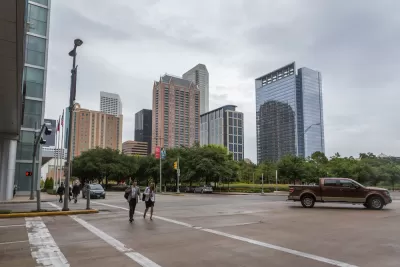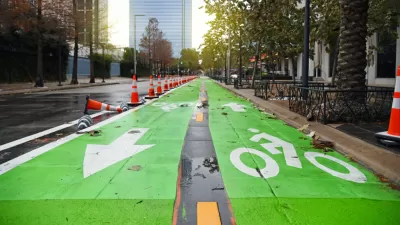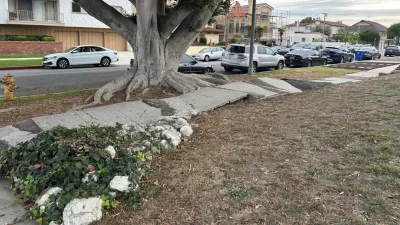Houston is fighting itself on walkability. While some build sidewalks and benches, parking minimums and outdated policies hold the city back.

Leah Binkovitz writes for Urban Edge about Houston's efforts to become more friendly to pedestrians. "Since 2013, the city’s Complete Streets executive order has required the city’s planning and public works departments to prioritize 'public roadways that take into account all users, including people who are driving or riding in cars, using mass transit, riding bikes, walking, using wheelchairs, driving or riding in trucks, driving or being transported by emergency vehicles, and being served at their residence or property by other users.'"
Still, the city has struggled to overcome policies at odds with the push for complete streets. "Things like minimum parking requirements — and no maximum limit — as well as an ongoing conflict with CenterPoint over the placement of utility poles that disrupt sidewalk space for users, particularly for people in wheelchairs or pushing strollers, continue to hamper what Wallace Brown said was the planning department’s commitment to walkability," Binkovitz reports. Parking requirements can be avoided if developers get special dispensation, but the hurdle can stop projects before they start.
FULL STORY: IS A WALKABLE HOUSTON POSSIBLE?

Maui's Vacation Rental Debate Turns Ugly
Verbal attacks, misinformation campaigns and fistfights plague a high-stakes debate to convert thousands of vacation rentals into long-term housing.

Planetizen Federal Action Tracker
A weekly monitor of how Trump’s orders and actions are impacting planners and planning in America.

San Francisco Suspends Traffic Calming Amidst Record Deaths
Citing “a challenging fiscal landscape,” the city will cease the program on the heels of 42 traffic deaths, including 24 pedestrians.

Defunct Pittsburgh Power Plant to Become Residential Tower
A decommissioned steam heat plant will be redeveloped into almost 100 affordable housing units.

Trump Prompts Restructuring of Transportation Research Board in “Unprecedented Overreach”
The TRB has eliminated more than half of its committees including those focused on climate, equity, and cities.

Amtrak Rolls Out New Orleans to Alabama “Mardi Gras” Train
The new service will operate morning and evening departures between Mobile and New Orleans.
Urban Design for Planners 1: Software Tools
This six-course series explores essential urban design concepts using open source software and equips planners with the tools they need to participate fully in the urban design process.
Planning for Universal Design
Learn the tools for implementing Universal Design in planning regulations.
Heyer Gruel & Associates PA
JM Goldson LLC
Custer County Colorado
City of Camden Redevelopment Agency
City of Astoria
Transportation Research & Education Center (TREC) at Portland State University
Jefferson Parish Government
Camden Redevelopment Agency
City of Claremont





























